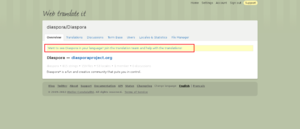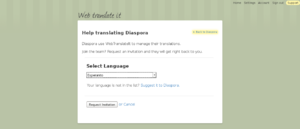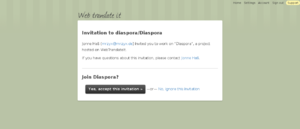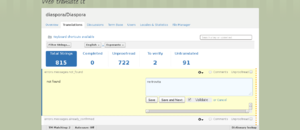Contribute translations: Difference between revisions
No edit summary |
(Mention to base PRs on stable.) |
||
| Line 42: | Line 42: | ||
{{Note|If you want to take the responsibility for your language then this method is completely fine, however using both methods at the same time is complicated and likely destroys work done by others. So please provide constant updates if you want to do it this way. Do keep in mind that you have to watch for changes yourself, there's no automatism that updates everything with this way. Also be sure that you are the person to be contacted about the translation in your local community and add a way to contact you/contribute to the translation to the ''Languages handled outside of WebTranslateIt'' section below.}} | {{Note|If you want to take the responsibility for your language then this method is completely fine, however using both methods at the same time is complicated and likely destroys work done by others. So please provide constant updates if you want to do it this way. Do keep in mind that you have to watch for changes yourself, there's no automatism that updates everything with this way. Also be sure that you are the person to be contacted about the translation in your local community and add a way to contact you/contribute to the translation to the ''Languages handled outside of WebTranslateIt'' section below.}} | ||
First read and follow our [[Git Workflow]]. | First read and follow our [[Git Workflow]]. However since resolving conflicts in a language you don't understand is almost impossible for us, please make sure to base your pull request on the '''stable''' branch, ''not'' develop. | ||
==== Files ==== | ==== Files ==== | ||
Revision as of 18:26, 21 August 2015
Translating the wiki
If you want to translate a page in the wiki make sure to include Template:Languages at the top. Then click on the red link for your language and start translating. If your language isn't yet in the template, feel free to add it.
For more discussion around translating the wiki please have a look at this Loomio discussion.
Translating other parts of the project
There are two ways you can contribute a translation: with a pull request or at WebTranslateIt. But lets start with some general notes first.
General notes
Languages with high inflection and grammar different to English
We integrated the awesome extensions siefca made for Rails and the i18n gem: i18n-inflector and i18n-inflector-rails. Based on what the user has written into the gender field and our definitions the gender is guessed. Look at the readme of i18n-inflector for more documentation on how to use them. You can use the named patterns easily via WebTranslateIt if you want to do so. However if you want to contribute a definition please make a pull request.
Choose the correct language code
First look if you could find an existing translation.
If you have to create a new one look here and check which code is used there for your language.
If your language isn't available there choose the right code according to ISO 639-1 (or ISO 639-2/3 if your language has no ISO 639-1 code) in lowercase letters. If you want to create a country-specific one, that is not the most spoken type of it, append - and your country code according to ISO 3166-1 in uppercase letters.
Examples:
- de for German
- de-AT for German specific to Austria
If you want to create formal or informal versions of your translation append _informal or _formal to the version that is less common for social networks.
Examples:
- fr for the French formal one and
- fr_informal for the informal one
Pull request
First read and follow our Git Workflow. However since resolving conflicts in a language you don't understand is almost impossible for us, please make sure to base your pull request on the stable branch, not develop.
Files
Diaspora
https://github.com/diaspora/diaspora
- config/locales/devise/devise.<code>.yml
- config/locales/diaspora/<code>.yml
- config/locales/javascript/javascript.<code>.yml
- Only add something to config/locales/inflections/<code>.yml if you know what you're doing, look at the note about inflected languages above for more information. If you're unsure just ignore that directory.
- config/locales/cldr/ is an upstream resource. You shouldn't need to touch it.
JSXC (chat frontend)
https://github.com/diaspora/jsxc
- locales/<code>.json
diasporafoundation.org
https://github.com/diaspora/diaspora-project-site
- config/locales/devise.<code>.yml
- config/locales/<code>.yml
New translation
If you want to create a new translation copy the en files, choose the correct language code (see above) and change every occurrence of en with your code. Don't forget the root element in the files!
If you want to fix an untranslatable strings or something feel free, but only add the new key to en.yml/devise.en.yml/javascript.en.yml.
Permanent Pull Request
If you want to give constant updates you can also notify me (jhass) and give me the URL to a Git repository and I'll do regular pulls in my update workflow.
WebTranslateIt
There are two projects for Diaspora on WebTranslateIt.
- diaspora/Diaspora for translating the software.
- diaspora/Website for translating diasporafoundation.org.
Languages handled outside of WebTranslateIt
diaspora/diaspora
- ca: repository
- es-VE: team
- gl: team
- sq: maintainer
Translating with WebTranslateIt
- First go to WebTranslateIt and create/sign-in to your account.
- Then go to the project site for Diaspora, JSXC (Chat frontend) and/or the project site for diasporafoundation.org and join the team.
- Choose your language or suggest a new one and request an invitation.
- You'll receive an email containing a link to accept your invitation. Note that this can take one or two days since I have to manually approve your request ;) Once you have gotten the mail and clicked on the link you'll see something like this:
- After you accepted it you can click on the "Translations" tab and start translating.
Thank you for contributing!



